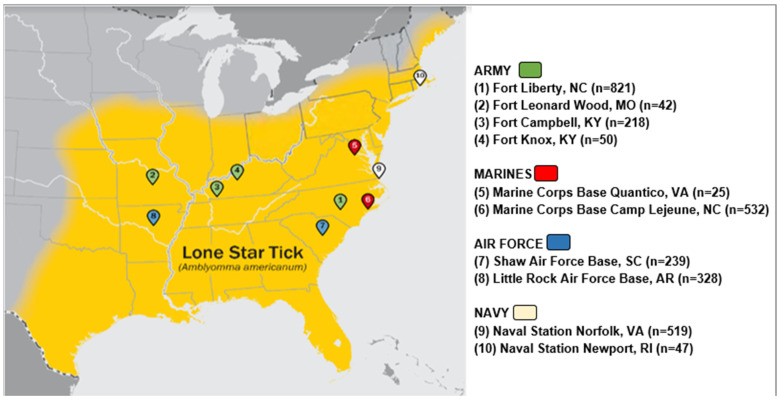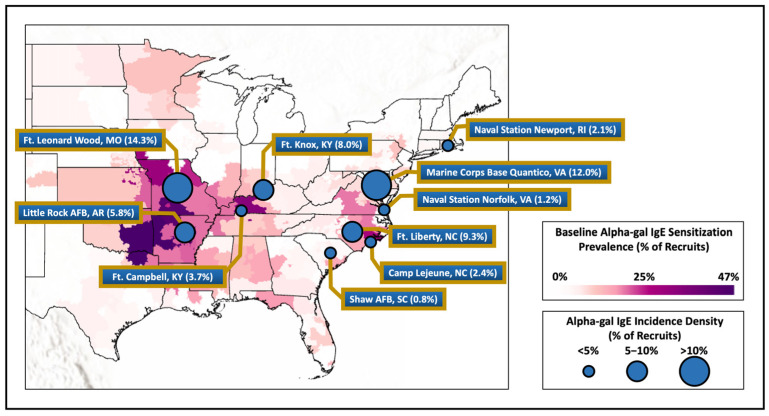Tick Bites Are Causing Sensitivity to Alpha-Gal IgE

Click to Enlarge: Location of military installations in relation to known lone star tick distribution at the time of the blood samples.
Source: Journal of Clinical Medicine
BETHESDA, MD — Tick bites in U.S. military personnel are leading to the development of antibodies to alpha-gal, a molecule found in most mammals, and possibly alpha-gal syndrome, a serious, potentially life-threatening allergic reaction.
Most at risk are white, male personnel who have occupations with higher outdoor exposure, according to a recent study.
The study published in the Journal of Clinical Medicine assessed the incidence of alpha-gal IgE seroconversion and identified associated demographic, occupational and geographical risk factors among U.S. military personnel.1
Study authors are affiliated with the Uniformed Services University of the Health Sciences and the Henry M. Jackson Foundation for the Advancement of Military Medicine, both in Bethesda, MD.
The development of immunoglobulin E (IgE) antibodies specific for galactose-alpha-1,3-galactose (alpha-gal) is an essential cause of mammalian meat allergy, commonly referred to as alpha-gal syndrome. Alpha-gal syndrome can lead to hives, swelling under the skin and a severe, life-threatening allergic reaction after eating red meat or exposure to other products containing alpha-gal.
Tick bites, particularly from the Amblyomma americanum (lone star tick), are believed to be the major cause of alpha-gal sensitization in the United States, particularly in southeastern regions, according to the researchers and the national Centers for Disease Control and Prevention (CDC).
“Alpha-gal syndrome is associated with tick bites, particularly the lone star tick,” said Cade M. Nylund, MD, MS, a colonel in the U.S. Air Force, Medical Corps and a professor and vice chair for research in the Department of Pediatrics at the Uniformed Services University of the Health Sciences.
Nylund told U.S. Medicine, “Little is known about how common alpha-gal antibodies are in military personnel. Over half of U.S. military personnel are stationed in areas where the lone star tick is present, significantly increasing their potential exposure to this tick species. Previous research along with our own research suggests a strong link between lone star tick bites and the development of alpha-gal antibodies in individuals.”
“Military service inherently involves heightened risk of tick exposure. Extensive field training exercises, often conducted for prolonged periods, expose personnel to a greater number of ticks compared to the general civilian population,” he pointed out. “This increased exposure increases the likelihood of multiple tick bites, further elevating the risk of alpha-gal sensitization. We really wanted to know how commonly military personnel develop new antibodies over time.”
This study tested serum samples for allergic antibodies to alpha-gal from Air Force, Army, Marine and Navy personnel stationed at bases across the Eastern, Southern and Midwestern U.S. where the lone star tick commonly lives, Nylund explained. The analysis included 3,000 servicemembers stationed at 10 military installations within the A. americanum tick range.
Samples from the DoD Serum Repository were evaluated at two time points at least 3 years apart, and the investigators assessed installation, sex, race and ethnicity, rank, military occupation and branch of service. Alpha-gal IgE seroconversion was defined as a change from <0.1 kU/L) to ≥0.1 kU/L, the study authors explained.
Military Occupation Important Predictor

Click to Enlarge: Baseline alpha-gal IgE sensitization of military members compared to measured incidence density of recruits from various installations around the United States. Legend. Map showing alpha-gal IgE sensitization at baseline laboratory testing for military recruits based on member’s home zip code of record at accession compared with the incidence density of alpha-gal IgE at the select military installations demonstrated by the circle size.
Source: Journal of Clinical Medicine
“One of our key findings was that around 5% of military personnel assigned to these bases developed new antibodies to alpha-gal over an average period of three and a half years,” Nylund advised. “The development of antibodies to alpha-gal by military installation varied. The highest seroconversion rate was found in Marine Corps Base Quantico and Fort Leonard Wood, Missouri, at 12% and 14%.
“Military occupation was a very important predictor for the development of alpha-gal antibodies. We found the highest rate of alpha-gal antibodies among military members in occupations like infantry, special forces or security forces. These are the same types of military occupations that are more likely to receive a tick bite because of longer and more regular time spent outdoors for training in the field.”
“We found that people with a self-reported race of white were much more likely to develop antibodies than other races and there were no differences in sex,” he added.
The study reported that among 2,821 personnel who were alpha-gal IgE-negative at baseline, 138 (4.9%) seroconverted over a mean interval of 3.4 years. Seroconversion was more frequent in males (5.5% vs. 1.9%), white individuals (6.6% vs. 1.0% in Black personnel and 1.5% in Hispanics) and individuals in occupations with higher presumed outdoor exposure (e.g., infantry/law enforcement: 12.7% vs. administrative: 1.2%). Significant differences were not found between sexes when accounting for military installation/occupation, but differences in race and ethnicity remained significant, the researchers pointed out.
“Our research indicates that alpha-gal syndrome, a potentially debilitating meat allergy, may be more prevalent among military personnel than previously understood,” Nylund said. “Although not all individuals who make allergic antibodies against alpha-gal have symptomatic red meat allergy, a substantial portion do. While our study did not directly examine clinical symptoms, the high prevalence of alpha-gal antibodies detected in military members suggests alpha-gal syndrome may be more common in the military than has been reported.”
He noted that alpha-gal syndrome differs from common food allergies like peanut allergies in several ways. Symptoms of alpha-gal syndrome often appear hours after consuming mammalian meat, making the diagnosis challenging. Also, the symptoms of alpha-gal syndrome differ from other common food allergies. In addition to typical allergic reactions like hives, alpha-gal syndrome can manifest with isolated gastrointestinal issues such as nausea, vomiting and diarrhea.
“Given these factors, our findings suggest a need for increased awareness and diagnostic testing for alpha-gal syndrome within the military, particularly among those with frequent field exposure and relevant clinical symptoms. Early identification and management of this condition can significantly improve the quality of life for affected service members,” Nylund explained.
Healthcare professionals treating military personnel bitten by the lone star tick, whether witnessed or not, should prioritize increasing awareness of associated illnesses, particularly alpha-gal syndrome, a delayed-onset meat allergy. Appropriate diagnostic testing is simple and readily available and includes serum alpha-gal IgE antibody testing, he recommended.
For preventative care, Nylund suggested for healthcare professionals to emphasize tick bite prevention strategies, such as wearing protective clothing and using insect repellent, along with properly treated uniforms.
“Our research has revealed a high incidence of tick-borne alpha-gal meat allergy among military personnel,” he concluded. “Further investigating alpha-gal allergy, including how it develops and effective prevention strategies, will be a very important next step.”
- Ching SJ, Susi A, Ailsworth SM, Workman LJ, Platts-Mills TAE, Wilson JM, Nylund CM. Incidence of Alpha-Gal IgE Sensitization in 3000 Military Personnel, Assessing Sex, Race, Installation, and Occupational Impacts. J Clin Med. 2024 Nov 26;13(23):7162. doi: 10.3390/jcm13237162. PMID: 39685618; PMCID: PMC11642159.

